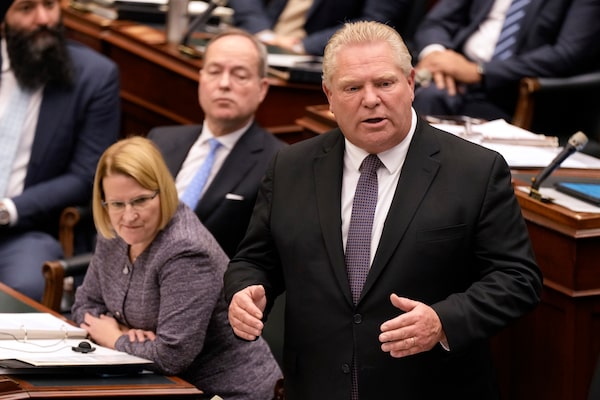
Ontario Premier Doug Ford answers a question as the legislature resumes at Queen's Park in Toronto on Feb. 21, 2023.Frank Gunn/The Canadian Press
The Ontario Court of Appeal has struck down the provincial government’s restrictions on election ads, siding with a coalition of unions that challenged the use of the Constitution’s notwithstanding clause to restrict spending by groups other than political parties before a campaign begins.
Premier Doug Ford’s 2021 election law changes imposed a $600,000 spending limit on what are known as “third party” groups, such as unions, advocacy organizations or corporations, that applied for 12 months in advance of the province’s official 28-day election campaign period.
In a ruling released Monday, a three-judge appeal panel ruled 2-1 that the rules violate the Constitution’s guarantees on voting rights, which are among the few rights in the Charter of Rights and Freedoms that governments cannot suspend using the notwithstanding clause. The decision says the ad rules deny voters access to information and “undermine the right of citizens to meaningfully participate in the political process and to be effectively represented.”
The ruling gives the government 12 months to craft a new version of its law that complies with the Charter. Andrew Kennedy, a spokesman for Ontario Attorney-General Doug Downey, said the government is disappointed with the ruling and would be appealing to the Supreme Court of Canada.
The decision is the latest constitutional drama for Mr. Ford and his Progressive Conservative government, which has now used or threatened to use the Charter’s notwithstanding clause three times – the first Ontario government to do so. In November, he invoked – then withdrew – the clause to impose a contract, and a strike ban, on an education workers union.
Monday’s appeal decision on spending limits follows similar controversies or court battles in Alberta and British Columbia over election ad rules in recent years.
The case is also the latest in a string of high-profile legal defeats for Mr. Ford’s government, a list that includes a failed challenge of the federal government’s carbon-pricing regime and a ruling against Mr. Ford’s mandatory anti-carbon-tax stickers for gas stations.
In June, 2021, a year before last year’s provincial election, Mr. Ford invoked the notwithstanding clause just days after a lower-court ruling scrapped his recently passed election-ad legislation for violating the Charter’s free-expression rights. That lower-court ruling would have left Ontario with no precampaign limits on third-party spending.
Mr. Ford’s legislation had amended rules brought in by the previous Liberal government in 2017 that capped political ad spending by non-party groups, such as unions or corporations, to $600,000 in the six months before the month-long election campaign period. The changes extended the time period to 12 months, but kept the same spending cap. (A $100,000 limit for third-party groups during the actual campaign remains.)
Critics charged the legislation was aimed at silencing ads from unions, such as the labour coalition Working Families that had targeted previous PC leaders with attack ads.
Working Families, which had launched a legal battle against the original legislation, then challenged Mr. Ford’s use of the Constitution’s override. A lower court sided with the government, which argued the restrictions were needed to ensure wealthy groups do not unduly influence elections.
The Opposition New Democrats said the Court of Appeal decision was part of a pattern of court losses for the Ford government.
“When they trample on the democratic rights of Ontarians, they are going to lose, and they going to lose again and again,” NDP Opposition Leader Marit Stiles told reporters at Queen’s Park. “And it’s time they got the message and stopped wasting millions of dollars that could be spent elsewhere.”
Monday’s appeal ruling concludes the lower-court judge failed to properly apply a legal standard that allows restrictions on election spending, but says they must be “carefully tailored” to ensure they do not unjustly infringe on voters’ rights to hear different points of view. Any restrictions must also still permit a “modest informational campaign,” a legal standard the appeal court says the lower-court judge did not consider.
Of the three-judge panel that heard the case, two judges, Justice Benjamin Zarnett and Justice Lorne Sossin, supported the decision, and one, Justice Mary Lou Benotto, dissented, siding instead with the lower-court judge.
Working Families lawyer Paul Cavalluzzo called the decision a significant victory for free and fair elections.
He also said the Premier was trying to restrict unions from spending in elections, even as his own party rakes in funds from wealthy donors, noting that Mr. Ford’s PC Party took in as much as $6-million in just one fundraising event last week.
“It’s ironic that this decision comes down a week after we find that the Premier had a fundraiser where he raised $6-million, and at the same time he is trying to nickel-and-dime trade unions that want to engage in political advertising,” Mr. Cavalluzzo said. “He certainly tried to create a very unfair playing field and fortunately the court has restrained him.”
The Canadian Civil Liberties Association, which intervened in the case, welcomed the decision, but lamented that the original rule gave the changes the “potential to impact the last election.”
The year-long precampaign spending restriction period Ontario tried to impose was more intrusive than the rules applied in federal elections and in many other provinces. Ottawa’s rules, for a regular fixed-date election, restrict spending by third-party groups for 2½ months before the campaign begins.